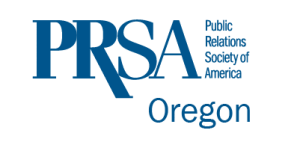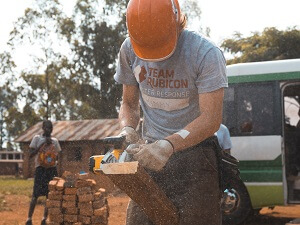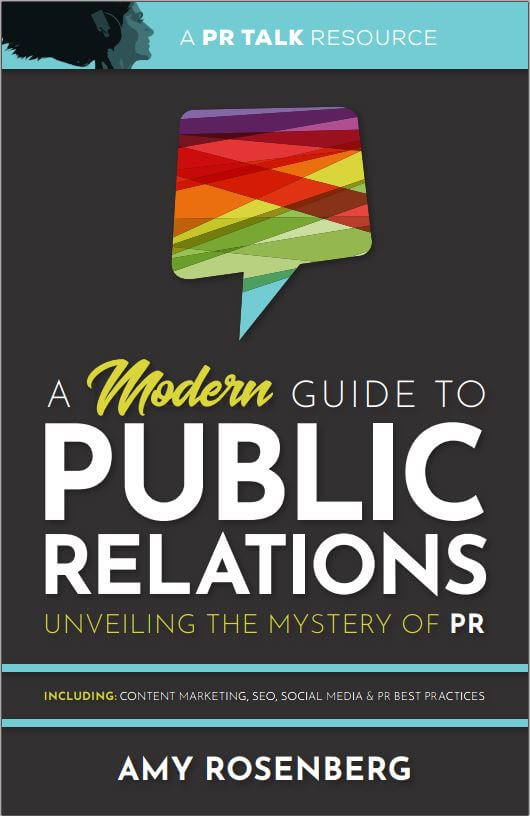What you’ll learn in this episode
In Episode 50, an interview with PR Talk’s host Amy Rosenberg, you will learn how Amy went from an intern at a PR agency to founding her own firm. Plus some insight into how she uses her psychology degree in the marketing world and what she likes to do outside of the office.
Episode Transcript
Amy: Hello.
Mike: Hi Amy.
Amy: How are you?
Mike: I’m good. On the last episode, we got to hear about me. In this episode, we get to hear about you.
Amy: Oh, joy.
Mike: Yeah.
Amy: I’m sure you’re all thrilled.
Mike: This time, it’s the actual Amy Show. Hey, well they’ve been listening, hopefully, to you for awhile, Right? I know whenever I listen to podcasts, I enjoy hearing about the host, and kind of how they got where they are. So, maybe we should start at Oregon?
Amy: Oh, you mean college?
Mike: Yes.
Amy: I guess. I normally hate hearing about where people went to college, and talking about it. I kind of think it’s boring, but I asked you, so yes, I went to U of O.
Mike: What was your degree there?
Amy: It was actually Psychology.
Mike: Did you go into Psychology?
Amy: No, I didn’t.
Mike: Do you use your degree?
Amy: I think so. I could lie, and say I use my degree, because it sounds really good. This podcast, I could literally talk an hour about just this.
Mike: How about two minutes?
Amy: The Psychology degree from U of O, is very specific. It’s very Science, and Statistics based. I use that degree when I do science PR, and I actually do do science PR, and nobody else touches this PR in the firm.
Mike: That is true.
Amy: Because I know the account so well, and I review the Science, and I can create a press release off of it, and I do feel that it’s from my degree, that I’m able to do that. So, my scientists do not need to explain the press to me, not that often. They don’t need to explain the study to me.
Mike: Right.
Amy: Well, I don’t get it perfect. They fix it, but they don’t have to guide me through it.
Mike: It kind of gave you the skills to be able to work your way through that.
Amy: That’s the hard skills, but then I think, I do feel that I have a lot of soft skills, that I use within my job every day, which is one main soft skill is mediation. I feel like I’m a mediator. All I do, is listen to people complain about this, that, and the other, and I can take it, and distill it, and put it into a solution from listening to them. It’s almost like bargaining or negotiating, and that is a skill of like a counselor, like family counseling, but I never learned that in school.
Mike: That’s interesting, isn’t it? I think it’s always amazing, that the skills that we’ve acquired, that we use in our day-to-day job, that one might not expect, right? Like mediation as a PR person?
Amy: When you’re in a client based situation, you’re more service-oriented. Let’s say you have one client, you don’t really have one client, you have five, ’cause you’ve got five people involved in the account on the client side. So, then you have to listen to all their needs, and then distill them down to to a common solution.
Mike: Right. Yeah. It reminds me also too of, when you say that you own a company, or you work for yourself. They’re like, oh, so you’re the boss. You’re like, no, no, no. I have clients. I have tons of bosses.
Amy: I’ve got like a hundred, and then on top of it, I have media asking me for things on a deadline.
Mike: Right, right, but you then have to ask your clients for it, and all that sort of stuff. So, let’s go back to you. So you went to Uof O, Psychology. I know there’s some business in there as well, which has led you in to this founding business owner person, but how did you start? Did you start in the PR world?
Amy: I got an internship.
Mike: So, classic.
Amy: Yeah.
Mike: You got an internship.
Amy: It ties in to what our friend with PR Talent was saying, at the last PRSA Recruiting Panel … Wait, am I in PR or not? I don’t know.
Mike: It already happened.
Amy: It ties in to what he was saying. There’s a lot of internships that turn in to jobs. Right after school, I’m enrolled to go to Lewis and Clark, to be in Counseling Psychology for a Masters Program. I got an internship at a PR firm for free … free internship. What do you think I …
Mike: What do you mean? You didn’t have to pay for the internship? Is that what you mean by for free? What do you mean, free?
Amy: Sure. Meaning, they weren’t going to pay me.
Mike: I don’t think that happens anymore.
Amy: What do you mean?
Mike: Free interns.
Amy: That normally we pay interns.
Mike: No, we pay them. Yeah.
Amy: Really? I don’t know.
Amy: Okay, so, instead of going to school, I chose this free internship, which is kind of funny, but it was pretty much the best thing I ever did, because I got my first job after a month.
Mike: You answered my question before I was going to ask it.
Amy: I have my talking points at the ready.
Mike: A month in to it, you were then hired and paid. Were you a paid intern at that point, or were you like an account coordinator, or something like that?
Amy: No, I was hired. I was half receptionist.
Mike: Okay.
Amy: Half time Account Coordinator, I guess, but then I stopped doing the receptionist job because I was too busy, and then they recognized, that and then they moved me over to it. They hired a receptionist. That was when we still wrote down messages.
Mike: Right, and had fax machines?
Amy: That’s when we were faxing out press releases.
Mike: Right. Yeah, I remember. I’ve heard stories about that.
Amy: Do you remember the story about the guy at this job, that hid the press releases under his desk, so he didn’t have to fax them out?
Mike: That was it, because he didn’t know how to use a fax machine? Was that it? No?
Amy: No, it was overwhelming to fax.
Mike: just to fax out?
Amy: Sometimes in PR … the most overwhelming part is the delivery part. So, now it’s email, but that’s still overwhelming, because you have to do your list.
Mike: Right, right.
Amy: But then, it was the faxing, and then I kind of get it, but I never would have lied about it, but that was pretty crazy.
Mike: Yeah. Yeah, I remember faxing things at some extent, so then they’re waiting for like the confirmation thing to come back, and all that sort of stuff. I guess it’s similar to email. It’s just a little bit different than … you know.
Amy: Yeah, we used to do our jobs by fax, but that was a cool first job.
Mike: Yeah, so how long about, were you there?
Amy: I was there for two years, but it was a really, really fun, busy, fast paced two years. We had event clients, and with events, you are really like on the ground, learning and working with the press.
Mike: What was your favorite event, that you’ve worked on?
Amy: Probably anything at the Rose Garden, or the Moda Center now, because it felt big. It felt like, Oh, I’m really doing this.
Mike: Like monster trucks?
Amy: No.
Mike: No?
Amy: Like Disney on Ice, and the circus.
Mike: Oh, yes.
Amy: Not that I would be a fan of the circus, but we actually have to lead the press through, for our preventative crisis management. To lead them through to see how the animals are taken care of. That was interesting.
Mike: Yeah. It’s lots of fun stuff, right?
Mike: Okay, so then, you were there for a couple of years, and you moved on to, still in PR, right? But for another agency?
Amy: Yeah, so I went over to, at the time it was called Gard and Gerber. Today, it’s just called Gard, and that just kind of moved me up a level, because the clients were just bigger. They were more well known, and more of what you would call serious clients, which now I think it’s just kinda funny to be cataloging clients like that. If you take a step back and look at the name of the clientele, you’ll understand what I’m saying. I moved from working on the circus, and the rodeo, and the this, and the that, to working on AAA of Oregon, OHSU, Standard Insurance, really serious.
Mike: Were you the voiceover person for these clients? Because I remember that Gard and Gerber was also advertising too, so you went from a straight PR firm.
Amy: Hopefully I wasn’t.
Mike: Not with that voice, right?
Amy: Yeah.
Mike: Well, you are now the host of a podcast, so maybe that’s in your future. Actually, I know we’re totally not on script here, but that’s not that we had one. Were you ever a spokesperson for any of these clients?
Amy: If I was, it was at OBPR, and it was totally unplanned.
Mike: Yeah, you just kind of stepped in.
Amy: OBPR was the name of the first firm, and that was fun. It was super fun. It was a good firm. Gard was a good firm too, and I learned to button down my business there, which was great. It’s just, I do think it’s funny that they’re different. In the PR world, different accounts are viewed differently, with more steam than others, and I just kind of sometimes think, all of that is bullshit.
Mike: Yeah, so then you left the PR world, sort of, for a little while. Tell me about that.
Amy: Everything was going great at Gard, but then my friend’s Mom, was selling a big condominium unit, or development, in Northwest Portland, and she wanted me to run the marketing for that. That was about 50 units, off of Northwest 23rd. It was called the Cambridge Condominiums, and I ran all of the marketing, but in doing so, I had to get my real estate license. As most construction is, it was a year late. So what happens when it’s a year late? Well, you don’t have as much to do. You already have your marketing set up. So, you have your real estate license, you might as well sell, right? So, I went in and sold some real estate … for Windermere, of course.
Mike: Right.
Amy: Their development was underneath Windermere anyways, so I already had my license there, so I was an an agent out of that Windermere office. It’s just interesting how life works, that Windermere is now a client of ours.
Mike: Right. Yeah, I’m sure that’s a coincidence.
Amy: But I’m skipping ahead. I did learn a lot being a realtor, that I use today.
Mike: Like what?
Amy: I’ve been working for myself for about 15 years, so I haven’t had to rely on any employer’s paycheck, for about 15 years.
Mike: Because when you’re a realtor, you basically work for yourself, right? Because you’re responsible for …
Amy: You don’t have any salary. You do essentially, have your own business, but having a business that’s just one thing. That’s not really what the point is of me saying this. The point is that, you have to learn how to make shit happen, to provide for yourself, and like you’re not sitting around waiting on a paycheck. You need to learn how to hustle, and I think I already had that, ’cause there’s quite a bit of hustle in PR anyways, so I had that hustle, but just needing to support myself, I learned how to do that really well as a realtor.
Amy: So, working at Windermere, I had the best of both worlds. I wasn’t working there. It was like I was a contractor, I guess, working for myself, using their logo, essentially. That’s how real estate works. You get to use their name. I had the best of both worlds, because I was basically selling real estate for myself, but then I also had this big condominium development, that I was working on that, that felt very strategic, and interesting. We would go in and meet with bankers, and ask for 50 million bucks. You know what I’m saying? I’m not holding an open house here.
Mike: Right, although you did that too.
Amy: Well, yeah, but like I had this, where we were like, no, we are preparing. We’re going to go in and get our developer a 50 million dollar loan. We’re going to prepare, for like a month for this. We’re going to take these bankers out. We’re going to drive them around the city, and show them our town. It’s serious real business stuff, that I was doing, at like 25. So, that was pretty cool. Again, that was from a connection. That was my best friend’s Mom, that worked there.
Mike: Right.
Amy: Anyway, and then that puppy sold, thank God. I mean, it took a while to sell that dang thing. That’s 50 units. So there was a team of us, and I sold those, meaning I helped my team. I’m never going to desert my team, but I had a baby. So, that was really hard, because it was a year late.
Mike: Well, it’s supposed to end, right. The whole thing was, it would end, and then baby would come, and the timing was supposed to work out perfect, but since you were relatively new to real estate, you didn’t quite yet know, that it’s always delayed.
Amy: It’s always delayed at least a year, and that didn’t work for our baby planning, which is great. I mean that’s a good problem to have, that we were able to have a baby, but I guess it threw me for a loop, because I had this baby, and then I was selling, or I was closing the unit. So, it’s a different type of sale. It’s already in escrow, but you’ve got to close it.
Amy: I stuck around, worked kind of part-time, to close those puppies, and then basically, was just so glad to get out of real estate, when those dang things were closed, because it was just off of schedule for me. I did stick around, and try and sell on my own as well. I thought, well, let’s see if I can make this work. When I say on my own, I mean not part of the development. Like, Hey, let’s pick up this little house here, let’s sell it, that kind of thing. Sure, maybe I sold a couple of things, but it just didn’t fit my lifestyle anymore, just selling one or two homes a month, you know?
Mike: Right.
Amy: Not having that big development to work on, and so, I quit. I just turned in my license and was like, well, it’s just going to be slow market anyway, so why pay these fees? So, I quit, and then I kind of went crazy not working. Remember?
Mike: So, then you got back into PR?
Amy: Well, yeah.
Mike: You were kind of still in PR, ’cause you were running the marketing, right? That was still a part of what you were doing, but just pushed the real estate stuff to the side, at least for a little while until getting your real estate license again.
Amy: After I stopped selling those puppies, I thought, I want to see if I still have it, and I’ve talked about it, and you all know what it is, when I’m talking about PR. I don’t know if you either have it, or you don’t, and I was worried that I might have lost it. So, I got back in the game, and I realized I still had it.
Mike: More than most.
Amy: Well, maybe. I was very happy to have still had it, and what do I mean by having it? I mean, landing stories.
Mike: Right.
Amy: I landed a few little stories for my clients. They were elated, and from there, I kept getting more clients.
Mike: If I remember, I don’t know if it was your first client, which I’m going to take credit for, or one of your first clients, but the reason you got this client, was that they were working with a big firm, that couldn’t get anything done.
Amy: Yeah. Which just makes me laugh. You either have it, or you don’t.
Mike: One of the things that I get asked … in my episode we talk about, what do you do today? And part of my job is business development and sales, and one of the things they ask, when you’re talking with somebody is, what makes your firm different than the others? And half the time, and I say it occasionally, but half the time, 90% of the time, I want to be like, well, we give a shit. We try. We care. I think part of that is, all of our clients have at least, if not have at least some access to us, the two owners of the company. We care. I think that has a lot to do with what it is. Even when you weren’t the owner of the company, when you were your first two PR jobs, your personality is you care. You have it. You care. You make sales. You make the calls. You make things happen.
Amy: Thank you. Well, I guess this is another topic that’s off, what we’re talking about. I just think it’s kind of interesting. I noticed when you talk about when you care about a client. So for me, when I run down my to-do list, it’s not the client name that I’m writing down, it’s the person’s name. I need to get this for Tim. I need to send this to Rob. I need to send this to duh, duh, duh. It’s person related, and I’m envisioning the person in my head, versus just the client.
Mike: Right.
Amy: Anyway, so that’s random. So, I was just kind of like …
Mike: So, you were consulting. You were freelancing.
Amy: … Doing a little bit of projects here and there, and then I got too much work at … remember that?
Mike: I do.
Amy: I got so much work, that I was going to fire half of my clients.
Mike: Right, and not take any new ones that were coming down.
Amy: Well, no, and then you looked at everything. You looked at the numbers as you do, and I do not do, and you said, “Well, wait a minute. I’ll just quit my job.”
Mike: Right.
Amy: That is how our company started, and then I was like, okay, and then that worked, and I was nervous at first, but it worked, ’cause that was maybe like six or seven years ago …
Mike: Yeah, yeah, seven years, eight years ago.
Amy: … that you quit your job.
Mike: Yeah.
Amy: I think that’s a big … quitting a job is a big step in a company formation. Tim Ferris with The 7-hour Workweek, or whatever it is. I love that book. He says, a good way to start a company, is to already have a job like a side … you start it as a side hustle.
Mike: You start it as a side hustle, right? Yeah.
Amy: I was in a privileged position, that I could be working from home as a freelancer.
Mike: Yeah, working part time.
Amy: You had your job, but we also had some of the real estate financial stuff that closed, coming in to help. That’s a position of privilege. But now, when you quit your job, that’s totally, oh wow, okay, we’re in this now.
Mike: Right.
Amy: We’re doing this.
Mike: This is 100%. Exactly.
Amy: It worked out, which every day, and this is how I feel like. I don’t know if this is just how to be humble or what, but I’m every day I think, well, I guess it’s working. I’m bewildered that it’s working. Do you know what I mean?
Mike: Well, yeah, and that keeps the hustle, right? I mean, that’s, that’s one of the reasons …
Amy: Exactly.
Mike: … A big reason that it is working, because you don’t sit back on your laurels, and Oh, we’ve got these great clients and they’re on retainer. It’ll just keep happening. No, you gotta prove it every single day.
Amy: Well, not only that, and then when you think about the person behind the client, that’s who I don’t want to let down.
Mike: Exactly.
Amy: So that’s who’s on our to-do list every day, is the person.
Mike: Yeah. So, you started the company, I joined the company. It’s grown. In addition to being the host of PR Talk, what else do you do?
Amy: Oh, God. Are you talking about little things, that I’m on a Board of, or something like that?
Mike: No, no, no, I’m talking about for Veracity
Amy: Oh, for Veracity.
Mike: Yeah.
Amy: Oh, my God. Oh, I don’t know. Well, I lead the client strategy, and what that means is, I basically help our freelancers come up with ways to do their job better. If they’re having problems getting something landed, we just work those problems out, and then I converse with the clients every day.
Mike: Yeah.
Amy: So, so that’s what I do for Veracity, but then you might consider, I guess I’m kind of doing some thought leadership, because I’m presenting here and there, and then I’m doing this podcast, and then doing blogging,
Mike: Right, and then doing blogging, and then there might be some upcoming episodes, that we may mention, that maybe you’re writing a book.
Amy: Right.
Mike: Yeah. Why are you writing a book?
Amy: I don’t know. It’s weird. Well, we’ll talk about that.
Mike: ‘Cause you want to share the love, right? It’s thought leadership, and education.
Amy: Yeah.
Mike: What about outside of work?
Amy: Well, we do have two kids.
Mike: Yeah.
Amy: Just to remind you, and a cat. The cat’s really important. I don’t know. I just like to micromanage my kids. I’m just kidding. I help my kids out. I go to their things, and I’m just involved with the school, and try not to volunteer so much at the school, because our kids are old enough now, that I want to let new parents take that over, but in the past, I was really active in the schools.
Mike: What do you do to relax? Do you watch movies? Do you read books? Do you listen to podcasts?
Amy: Well, I read every night, so I can’t sleep if I don’t read, and I feel that I have a very, very strong life in literature, or in books. I feel like books, are adding a lot of value to my life, just in general. I have a very active literature life, even though I read crap. By the way, don’t ask me what I read. I don’t even know. Seriously, I read so much, that I don’t remember what I read, ’cause I read off of the Libby App.
Mike: I was looking at … what is it? iTunes purchases. iBook purchases. Wow. I know you read every night, but you read a lot.
Amy: Well, hopefully I haven’t purchased that much on that, because I would rather not pay for that. My trick is to download it for free on that. If I like it, then I’ll go to Libby.
Mike: Oh, maybe those are previews.
Amy: Yeah, and then I’ll go to Libby, and then I’ll put a hold on it.
Mike: That’s a good trick, for anybody who wants to … ‘Cause yeah, you’re right. If you read a lot, it can get expensive, right?
Amy: Oh, yeah.
Mike: The library is free, but getting to the library, and all that, isn’t that easy. So, Libby is the app. It’s the library app.
Amy: Yeah, it’s connected to the Multnomah County Library. So, there’s reading, and then Friday night movies we do with our family, we love, and then I don’t know, I guess I work out, but not as much as you do. I mean, I used to love working out, but I hurt my back, but I’m trying to get back in to it.
Mike: Yeah, well that is certainly fun. So, we teased it in my episode a little bit. I don’t know if it was a teaser or not, but we talked about your famous maiden name. I’m going to leave it, and you can make a comment if you want, but I thought it was really funny. Her maiden name is Weinhouse. Everybody’s heard of Amy Winehouse. This was actually after she was married, is when the Amy Winehouse got popular, but I remember a friend … it coming on the radio when I was driving with a friend, and him telling me that that was her name, and then shortly after that, riding with Amy and it coming on to me saying, Oh, do you know who this is? This is Amy Winehouse, and what was your reaction to that?
Amy: She spells her name wrong.
Mike: And you did not like her music.
Amy: Oh, I didn’t?
Mike: No.
Amy: Oh, ’cause I like it now.
Mike: Well, yeah. I think you thought that she stole your name.
Amy: I was a little irritated, but I’m over it now.
Mike: You’re over it now. All right. Until next time.
Amy: Take good care.
![How PR is Different [Podcast]](https://www.veracityagency.com/wp-content/uploads/How-PR-is-Different-800x600-1.jpg)


![PR Roles and Mindset [Podcast]](https://www.veracityagency.com/wp-content/uploads/PR-Roles-and-Mindset-800x600-1.png)
![PR Perfectionist [Podcast]](https://www.veracityagency.com/wp-content/uploads/PR-Perfectionist-800x600-1.jpg)

![A Crazy Guide to PR [Podcast]](https://www.veracityagency.com/wp-content/uploads/A-Crazy-Guide-to-PR-PR-Talk-Podcast.jpg)
![PR Talk Host Amy Rosenberg [Podcast]](https://www.veracityagency.com/wp-content/uploads/Amy-Rosenberg-PR-Talk-Host.jpg)







